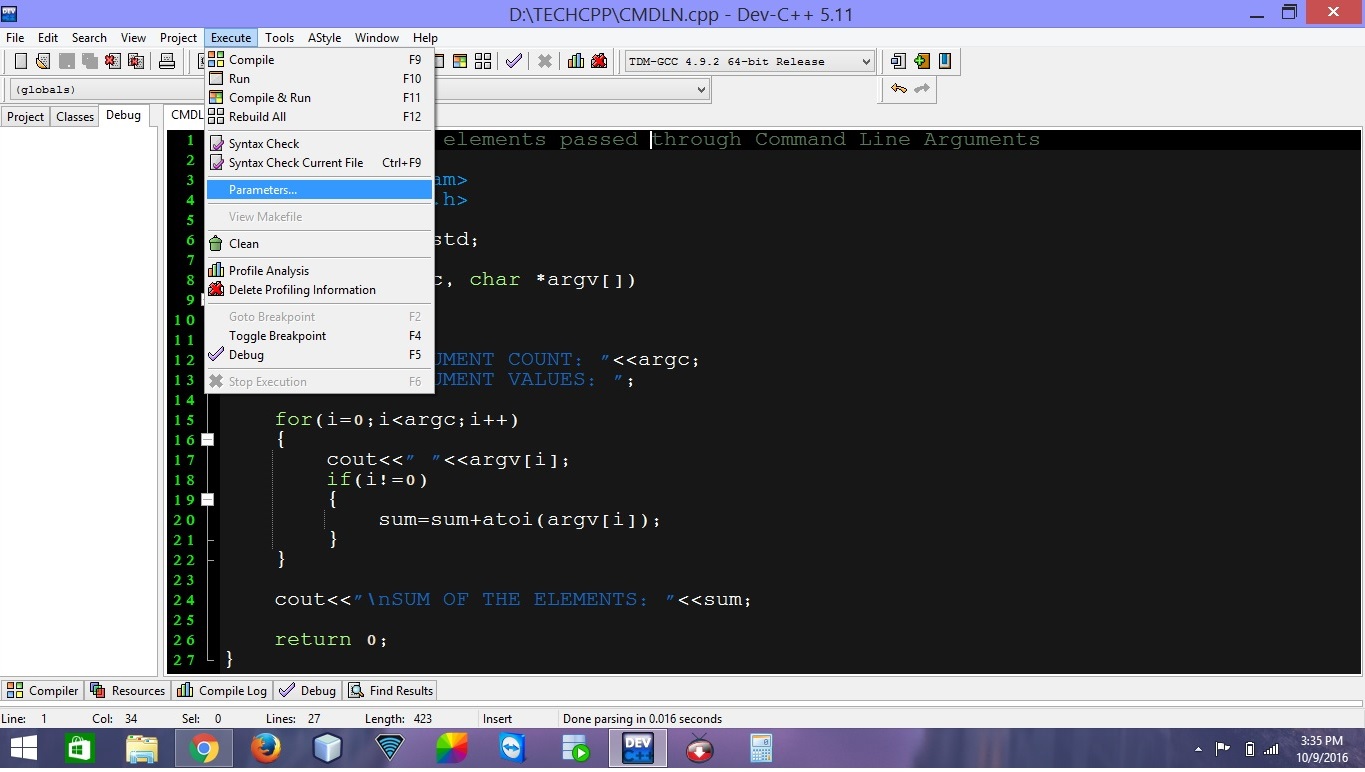How To Run Dev C++ Command Prompt Argc Argv
------ Build started: Project: 3090Hw5Threshold, Configuration: Debug Win32 ------
Compiling..
Threshold.cpp
Linking..
Embedding manifest..
Build log was saved at 'file://c:Documents and SettingsKyMy DocumentsVisual Studio 2008Projects3090Hw5ThresholdSolution3090Hw5ThresholdDebugBuildLog.htm'
3090Hw5Threshold - 0 error(s), 0 warning(s)
Build: 1 succeeded, 0 failed, 0 up-to-date, 0 skipped
It says 1 succeeded but I don't see a Threshold.exe after I build it. Threshold.cpp has this code segment:
#include <iostream>
#include <fstream>
#include 'image.h'
using namespace std;
int readImageHeader(char[], int&, int&, int&, bool&);
int readImage(char[], ImageType&);
int writeImage(char[], ImageType&);
int main(int argc, char *argv[])
{
int i, j;
int M, N, Q;
bool type;
int val;
int thresh;
// read image header
readImageHeader(argv[1], N, M, Q, type);
// allocate memory for the image array
ImageType image(N, M, Q);
// read image
readImage(argv[1], image);
cout << 'Enter threshold: ';
cin >> thresh;
// threshold image
for(i=0; i<N; i++)
for(j=0; j<M; j++) {
image.getPixelVal(i, j, val);
if(val < thresh)
image.setPixelVal(i, j, 255);
else
image.setPixelVal(i, j, 0);
}
// write image
writeImage(argv[2], image);
return (1);
}
Inside the main, it uses argc and *argv[] and I need to call it from the console like what Duoas displayed. However, I can't even compile/build it. It works with the make command of linux though so the code is fine. Eventually, I will want to hard code the main such that it'll take imageIN and output imageOUT automatically since I'll be testing it a lot.
Ex: main( ImageToProcess, ImageAfterProcessing)
The following are the steps to execute a program with Command Line Argument inside Turbo C/C Compiler: 1. Open Turbo C Open Turbo C. If you don't have, you can download Turbo C from here. Write a program Following is a simple example which checks if there is. Command-line arguments are given after the name of a program in command-line operating systems like DOS or Linux, and are passed in to the program from the operating system. To use command line arguments in your program, you must first understand the full declaration of the main function, which previously has accepted no arguments. May 27, 2011 In this tutorial on C I want to show you the command line arguments. Actually we will give parameters to the main function.
C Command Prompt Commands
i've never knew how to use command line arguments since the first source code i used to edit(and from i learned basics of c++) was using a config file to 'read' user input data on program startup and not command line arguments.
now my question, what's the difference between using command line arguments and creating a special designed class to read a config file (config.cfg) looking like this:

Auto tune up repair layton utah. i know that on the first thought, the cfg option is far more complicated and timeconsuming, but almost every program needs a config file to read the default values for the data it needs
How To Run Dev C Command Prompt Argc Argv In C
i ask this cuz i'm not sure if it's worth learning to use command line arguments or not
- 6 Contributors
- forum 12 Replies
- 812 Views
- 1 Month Discussion Span
- commentLatest Postby dospyLatest Post
Narue5,707
Format C Command Prompt
i ask this cuz i'm not sure if it's worth learning to use command line arguments or not
Command line arguments are very simple and worth knowing. For example:
The arguments correspond exactly to what's typed into the console, which means there's a caveat that args[0] will be the program name in some form[*]. That's really all there is to it. You can quibble about the nuances of the argc and argv parameters, but there's little point in doing so, in my opinion. ;)
[*] 'Some form' means it could be an empty string if the program name isn't available, or it could be a full path, or a relative path, or even just the executable name (to list some common results).